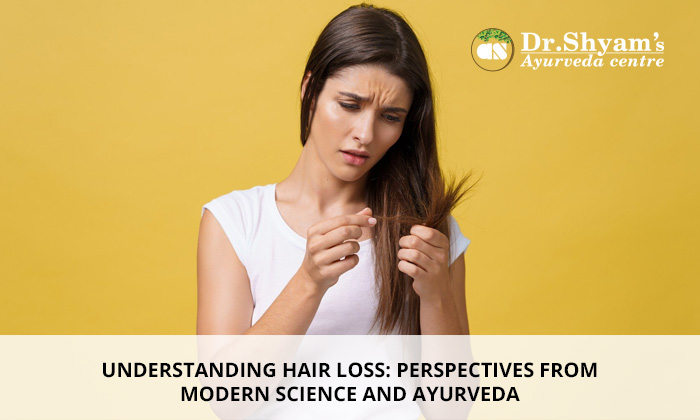
Understanding Hair Loss: Perspectives from Modern Science and Ayurveda
Posted May 04, 2024Hair loss, a widespread concern known medically as alopecia, affects millions worldwide irrespective of age, gender, or ethnicity. While a certain degree of hair shedding is normal, excessive loss can be alarming, often hinting at underlying issues. Exploring the causes, preventive measures, and treatments for hair loss is crucial for maintaining healthy hair and overall well-being. In this pursuit, seeking holistic solutions such as Ayurveda treatment in Dubai can provide a comprehensive approach that addresses both the physical and emotional aspects of hair health, offering personalized care to promote rejuvenation and vitality from within.
Causes of Hair Loss:
Hair loss stems from various factors, encompassing genetics, hormonal fluctuations, medical conditions, lifestyle choices, and environmental influences:
- Genetics: Family history significantly influences susceptibility to hair loss. A lineage with hair loss history increases individual risk.
- Hormonal Changes: Fluctuations, like those during pregnancy, childbirth, menopause, or thyroid disorders, can trigger hair loss.
- Medical Conditions: Alopecia areata, scalp infections, autoimmune disorders, and nutritional deficiencies are among conditions linked to hair loss.
- Stress: Emotional or physical stress disrupts the hair growth cycle, leading to increased shedding.
- Poor Nutrition: Inadequate intake of vital nutrients weakens hair strands, exacerbating hair loss.
- Hair Care Practices: Excessive use of styling tools, harsh hair products, tight hairstyles, and frequent manipulation contribute to hair shaft damage and breakage.
- Age: Aging leads to follicle shrinkage, resulting in thinner, fragile hair.
Ayurvedic Insights into Hair Loss:
Ayurveda, an ancient holistic system, attributes hair loss to dosha imbalances—Vata, Pitta, and Kapha—that regulate bodily functions. Each imbalance manifests differently:
- Vata Imbalance: Results in dry, brittle hair and increased hair loss.
- Pitta Imbalance: Triggers scalp inflammation and premature graying.
- Kapha Imbalance: Leads to excess scalp oiliness and congestion, contributing to hair loss. Ayurvedic treatments aim to rebalance these doshas for harmony restoration.
Ayurvedic Treatments and Remedies:
Ayurvedic approaches offer natural remedies and practices to mitigate hair loss:
Scalp Massage (Siro Abhyanga): Nourishes hair follicles, enhances scalp blood circulation, and strengthens roots. Oils like Bhringaraja taila, Surasadi taila, Triphaldi kera taila etc are massaged gently during the treatment.
Herbal Hair Packs (Talapothichil): Blend natural ingredients like Amla, Bhringraj, Neem, Fenugreek, or Inhouse prepared hair masks are used to nourish the scalp, stimulate hair growth, and reduce hair fall.
Scalp oil Pouring (Shirodhara): An Ayurvedic therapy involving warm oil poured on the forehead, promotes scalp nourishment, improves blood circulation, and reduces stress, indirectly helping to prevent hair fall by addressing underlying causes and enhancing hair health.
Buttermilk therapy (Takradhara): A form of Ayurvedic treatment where medicated buttermilk is poured over the forehead, aids in scalp hydration, balances scalp pH, and nourishes hair follicles, potentially reducing hair fall by addressing scalp health and promoting stronger hair growth.
Nasal oil Application (Nasya): An Ayurvedic therapy involving nasal administration of herbal oils or solutions, can improve blood circulation to the scalp, balance doshas affecting hair health, and alleviate sinus issues, indirectly aiding in reducing hair fall by promoting scalp health and nourishing hair follicles.
Ayurvedic Hair Oils: Infused with herbs like Amla, Brahmi, Bhringraj, and Hibiscus, these oils rejuvenate and nourish hair. Regular massage strengthens roots and improves texture.
Balanced Diet: Emphasizes nutrient-rich foods—leafy greens, fruits, nuts, seeds, whole grains, and lean proteins—to support hair growth. Hydration with water and herbal teas aids toxin elimination.
Ayurvedic Supplements: Herbs like Ashwagandha, Amla, Shatavari, and Brahmi enhance overall health, including hair health. Dosage and combinations are tailored to individual needs by Ayurvedic practitioners.
Prevention Strategies and Lifestyle Recommendations:
While genetics and age are uncontrollable factors, preventive measures can minimize hair loss:
- Balanced Diet: Ensure adequate intake of proteins, vitamins, and minerals.
- Stress Management: Employ techniques like yoga, meditation, or hobbies to alleviate stress.
- Gentle Hair Care: Avoid harsh products, over-brushing, and tight hairstyles.
- Protection: Shield hair from heat and UV exposure, and limit smoking and alcohol.
- Regular Exercise: Enhances scalp blood circulation, promoting hair growth.
Conclusion:
Combining modern scientific understanding with ancient Ayurvedic wisdom offers holistic approaches to managing hair loss. By incorporating Ayurvedic treatments, remedies, and lifestyle practices, individuals can nurture healthy hair from within, strengthening roots and reducing hair fall naturally. However, consulting Ayurvedic practitioners or healthcare professionals before starting any regimen is crucial, especially for those with underlying conditions. Come to our Al Barsha branch for a comprehensive consultation addressing your concerns about hair fall. With patience, consistency, and a holistic approach, individuals can attain vibrant, healthy hair, benefiting from the timeless wisdom of Ayurveda.
